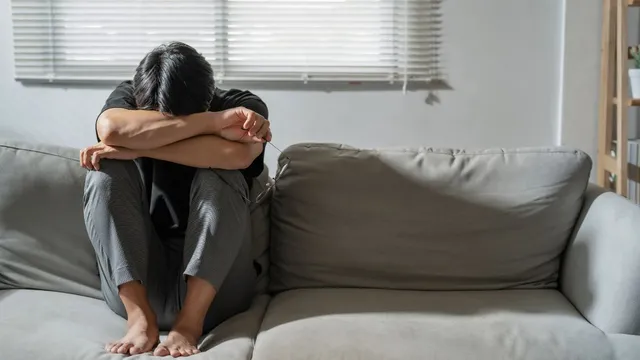- By Priyanka Munshi
- Tue, 24 Sep 2024 06:13 PM (IST)
- Source:JND
Understanding everything about lower teen anxiety is extremely important in today's time, as this is a major problem faced by many teenagers. The pressure they experience often stems from school, social media, relationships, and future uncertainties. Many teenagers also face overwhelming stress, which naturally leads to anxiety. What’s more important is recognizing the signs of lower teen anxiety, such as constant worrying, restlessness, trouble concentrating, and physical symptoms like headaches or stomachaches.
If this anxiety is not treated in time, it can negatively impact a teenager's health, potentially leading to depression, academic struggles, and strained relationships. When parents, teachers, and peers are fully aware of lower teen anxiety, they can provide support and help teens learn coping mechanisms like mindfulness, exercise, and therapy. Equally important is creating a comfortable space where teens can talk openly about their anxiety without fear of judgment. In a conversation with Jagran English, Scarlett Smout, a Research Associate at The Matilda Centre at the University of Sydney, discussed six key habits linked to lower teen anxiety:
1. Prioritize Sleep
Sleep plays a vital role in mental health. The study found that for each additional hour of sleep between grades 6 and 10 (ages 11-16), there was a 9% reduction in psychological distress. Setting a consistent bedtime and improving sleep hygiene can improve teens' mental health.
2. Get Moving
Physical activity is a great way to alleviate stress and lower anxiety. The study showed that for each additional day teens engaged in 60 minutes of moderate-to-vigorous physical activity, there was a 3% decrease in psychological distress. Whether through team sports, running, or brisk walking, regular movement helps reduce anxiety.
3. Eat More Fruits And Vegetables
Diet also matters for mental well-being. Adding just one extra serving of fruits or vegetables each day was linked to a 4% drop in psychological distress. Encouraging teens to choose healthier snacks and add more greens to their meals can make a positive difference.
4. Limit Junk Food And Sugary Drinks
Consuming junk food and sugary drinks is associated with increased stress and anxiety. The study found that each additional serving of these unhealthy foods was connected to a 2% rise in psychological distress. Reducing processed foods in a teen's diet can improve both physical and emotional health.
5. Cut Down On Screen Time
Excessive screen time is linked to anxiety in teens, and the study confirmed this connection. For every additional hour of recreational screen time, there was a 2% increase in psychological distress. While eliminating screens entirely is difficult, setting boundaries can help improve mental well-being.
Also Read: Can Kidney Stones Cause Cancer? Here's What Expert Has To Say
6. Don’t Take Up Smoking
Though smoking is less common among early adolescents, those who started smoking between grades 7 and 10 experienced a 36% increase in psychological distress. Encouraging teens to avoid smoking or helping them quit early on can prevent mental health issues.
Additionally, research from the University of Sydney’s Matilda Centre found that high school students with severe depressive symptoms were twice as likely to have tried e-cigarettes compared to those without depressive symptoms.
Small Changes, Big Impact
The good news is that even small changes can make a meaningful difference. Teens don’t need to overhaul their entire lifestyle overnight. Gradually adding an hour of sleep, incorporating more veggies, cutting down on sugary drinks, or reducing screen time can all help lessen anxiety and promote better mental health.
Parents Play A Key Role
Parents play an important role in shaping their teens' habits. By setting examples with their own healthy behaviors, encouraging family activities like preparing balanced meals, and making small, consistent efforts, they can improve their teen's mental health.
Beyond Lifestyle Habits
Scarlett Smout emphasized that lifestyle habits are only one part of the mental health equation. For teens struggling with persistent anxiety or sadness, professional support may be necessary.
Also Read: Know About Importance Of Folic Acid During Pregnancy; Experts Share Valuable Insights
Roma Gill, Head of School Welfare and Wellness at Delhi Public School International in Gurugram, added, “Teenagers today face significant pressures, and schools can play a crucial role in helping them manage anxiety by encouraging healthy habits. Physical activity through PE classes or school sports is an excellent way to reduce stress and enhance mental health. Adequate sleep is equally important, and schools can support this by keeping homework loads reasonable and emphasizing the value of rest. Incorporating mindfulness practices, such as breathing exercises or meditation, into the school day can help students stay calm when overwhelmed. Fostering strong relationships with peers and teachers creates a supportive environment, making students feel less isolated. Reducing screen time and encouraging face-to-face interactions can also help teens take a break from social media stress. Lastly, teaching effective time management and realistic goal-setting can help students avoid feeling overwhelmed. By promoting these practices, schools can help teens manage anxiety and feel more in control of their lives.”

